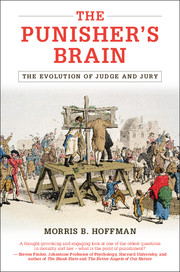Book contents
- Frontmatter
- Contents
- Acknowledgments
- Introduction
- 1 The Most Original of Original Sins
- 2 Detecting and Blaming
- 3 First-Party Punishment: Conscience and Guilt
- 4 Second-Party Punishment: Retaliation and Revenge
- 5 Third-Party Punishment: Retribution
- 6 Forgiveness and Its Signals
- 7 Delegating Punishment
- 8 Legal Dissonances
- 9 Evaluating Some Process Dissonances
- 10 Into the Gap: Evaluating Some Substantive Dissonances
- 11 Brains Punishing Brains
- Index
- References
2 - Detecting and Blaming
Published online by Cambridge University Press: 05 May 2014
- Frontmatter
- Contents
- Acknowledgments
- Introduction
- 1 The Most Original of Original Sins
- 2 Detecting and Blaming
- 3 First-Party Punishment: Conscience and Guilt
- 4 Second-Party Punishment: Retaliation and Revenge
- 5 Third-Party Punishment: Retribution
- 6 Forgiveness and Its Signals
- 7 Delegating Punishment
- 8 Legal Dissonances
- 9 Evaluating Some Process Dissonances
- 10 Into the Gap: Evaluating Some Substantive Dissonances
- 11 Brains Punishing Brains
- Index
- References
Summary
Draw the curtain, the fraud is over.
François RabelaisDetecting Cheaters
At the end of the movie Casablanca, Rick (Humphrey Bogart) shoots a German major who is trying to prevent Ilsa (Ingrid Bergman) and her husband from fleeing. The local police arrive, led by Rick's friend Louie (Claude Rains). Louie knows Rick was the shooter, but rather than arrest him Louie famously tells his officers to “round up the usual suspects.”
It seems obvious that we cannot effectively punish cheating without knowing who to punish. If deterrence had mattered less to the social stability of our emergent groups, we probably could have gotten away with a symbolic kind of halfhearted punishment, with “rounding up the usual suspects.” On the other hand, if deterrence had mattered more we might have gotten away with punishing everybody or a subset of everybody, without caringmuch about individual guilt. Roman legions suffered a practice called decimation, under which every tenth soldier in a disobedient or cowardly legion was killed regardless of the extent of his individual participation in the disobedience or cowardice.
- Type
- Chapter
- Information
- The Punisher's BrainThe Evolution of Judge and Jury, pp. 54 - 91Publisher: Cambridge University PressPrint publication year: 2014



